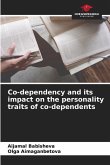This book explores how our temperamental proclivities interact with our political leanings, shedding light on why people perceive the world differently. Focusing on the Five Factor Model of personality, currently the most popular framework in psychology research, the text unpacks the literature on the association between political orientations and personality traits. While only part of the puzzle, growing evidence suggests personality traits have a significant impact on our political convictions and voting patterns. In some instances, certain traits may even make individuals more prone to holding authoritarian and prejudicial views. Understanding these dynamics can help people better navigate political differences and conflicts, and will be of interest to students of personality psychology and students of political ideologies.
Bitte wählen Sie Ihr Anliegen aus.
Rechnungen
Retourenschein anfordern
Bestellstatus
Storno








